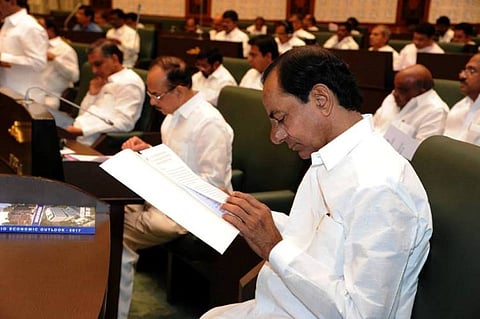

The Telangana government presented a tax-free, revenue-surplus budget for 2017-18 on Monday, proposing an expenditure of Rs 1,49,646 crore - an increase of 14.75% over the previous year.
The budget estimates for 2017-18 indicate a revenue surplus of Rs 4,571.30 crore and a fiscal deficit of Rs 26,096.31 crore, which is 3.48% of the estimated Gross State Domestic Product (GSDP).
Finance Minister Etela Rajender said that demonetisation of high-value currency notes had its bearing on the budget, as it adversely affected the revenue collections in the current year.
However, he was optimistic that with reduction in cash transactions, the tax compliance would improve and there could be some improvement in the tax devolution from the Centre.
Caste-based vocations
In what seems like an attempt to strengthen its vote bank in the run-up to the 2019 elections, the TRS government has announced several schemes for artisans and communities engaged in different traditional occupations.
The government has decided to procure and distribute 84 lakh sheep over the next two years to four lakh Yadava families, traditionally dependent on sheep rearing.
As Gangaputra, Bestha, Goondla, Bantu, Mudiraj/Tenugu and Boya communities are dependent on fisheries, the government has decided to give thrust to the sector.
A special assistance was announced to Nayi Brahmins for establishing modern, cleaner and hygienic hair cutting saloons and to washermen for washing machines, driers and ironing-boxes.
The government said that it will also extend financial assistance and provide modern tools to artisans belonging to different communities like Vishwakarma, Avusula, Kammari, Kanchari, and Vadrangi.
The Gouds, who are dependent on toddy-tapping, will also be helped, the state said.
2-BHK scheme
The '2-BHK scheme' was part of KCR's poll promises to build 2.6 lakh double bed-room houses for the poor in rural and urban areas across the state.
However, the Chief Minister's pet scheme got no allocation in the budget for the second consecutive year.
This also comes at a time when the state government has been struggling to keep up its promise.
According to reports, the housing scheme has not witnessed any progress in the state, except in KCR's adopted villages of Erravalli in Siddipet district and Narsannapet in Markook mandal.
Many builders have refused to take up construction for the state, despite officials offering several incentives, including cement at a cheaper rate and free sand.
Earlier, Chief Secretary SP Singh sent a fresh directive to district collectors to speed up the process of identifying land for construction of the houses.
In 2014, KCR had promised to build 2-bedroom homes for the homeless and those living in thatched houses, each costing Rs 3 lakh.
In 2015, KCR granted pattas to 10,300 families, promising to provide 2BHK homes, complete with a common living area, a kitchen and two toilets.
KCR held a massive house-warming ceremony at Erravalli and Narsannapet villages in December last year, where 500 families in two villages moved from their huts and 'kutcha' houses into permanent residences.
Since then, there has been no more ribbon cutting by the Chief Minister.
'KCR kits'
In another major move, the government has proposed to provide Rs 12,000 each to women undergoing institutional delivery in a government hospital. An additional Rs 1,000 each will be given to women giving birth to baby girls.
'KCR kit', named after Chief Minister K Chandrasekhar Rao, will be provided for the newborn. The kit consists of 16 essential items needed for the baby for three months.
According to reports, this includes soaps for mother and child, baby oil, a cradle, mosquito net, dresses, sarees, handbag, towels, napkins, powder, diapers, shampoo and toys for the child.
This has been based on Tamil Nadu's 'AmmaKit' introduced by late CM J Jayalalithaa, and was reportedly proposed after a team of officials from Telangana's health department visited TN, to study the scheme.
The amount proposed under this scheme is Rs 605 crore.
What about Hyderabad?
The state allocated Rs 1,000 crore for the Greater Hyderabad Municipal Corporation (GHMC) and also said that the city's battered roads would be fixed at a cost of around Rs 350 crore.
The Times of India reported that the GHMC had been facing a financial crisis for a few years now, and this budget was a big boost, but did not do enough to bail the corporation out.
The TOI report adds that the GHMC had sought Rs 2,018 crore for improving roads in the city, along with another Rs 300 crore for constructing new storm water drains.
However, most of its requests were not met.
Other reports add that the Hyderabad Metropolitan Development Authority (HMDA) was allocated only Rs 485 crore against its requirement of Rs 950 crore.
In a positive move, the state did sanction Rs 377 crore as part of its plan to clean the Musi river, which is notoriously known to become a large open sewer as it passes through various places in the city.
M Veda Kumar, an activist who has been running a campaign to save the river, told The Hindu, "We need a long-term plan of perhaps 8-10 years with an outlay of at least Rs 1,000 crore to Rs 1,500 crore. But it is a good beginning we can try to ensure that only clean water flows into the river and there is no dumping of solid waste in catchment area"
Meanwhile, the Finance Minister allocated Rs 23,675 crore for the irrigation and agriculture sector, while the education sector also got a hike, with an allocation of Rs 12,705 crore.
Another Rs 5,976 crore was allocated for health, while Rs 14,723 crore was allocated for the Panchayati Raj across the state.
IANS inputs